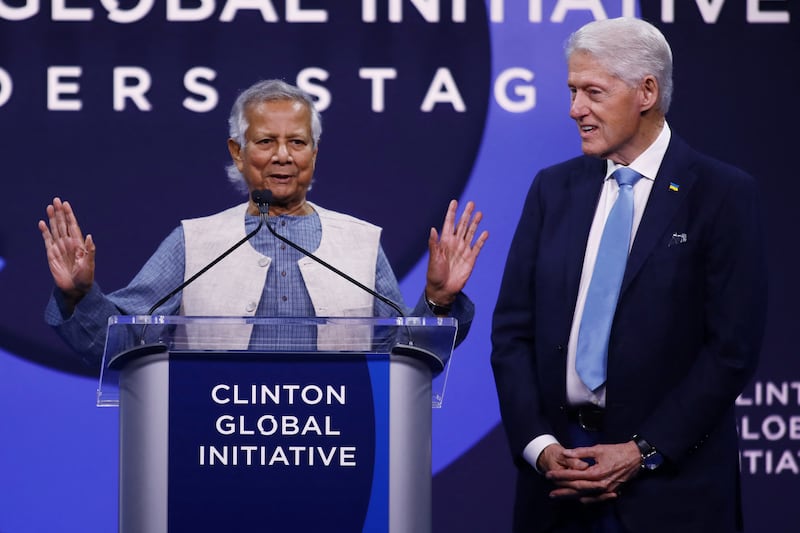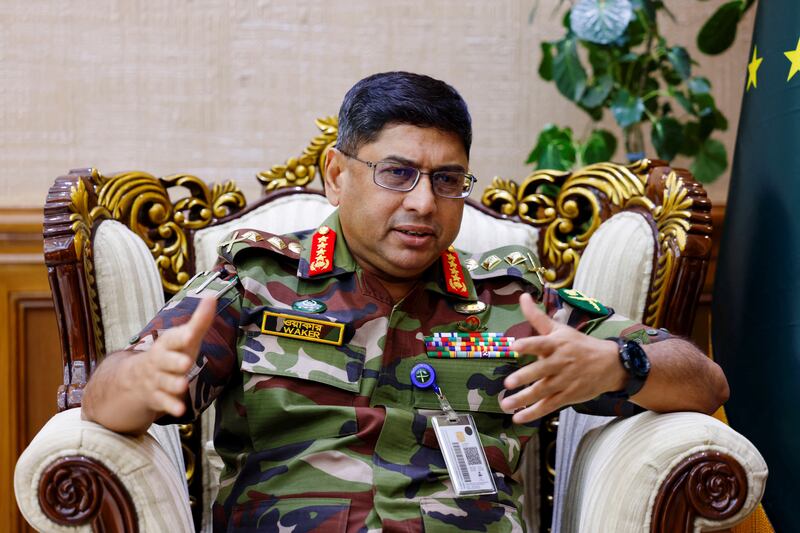Updated at 6:25 p.m. ET on 2024-09-24
U.S. President Joe Biden offered American support and praised students who led a protest movement in Bangladesh as he met with the country’s interim leader, Muhammad Yunus, at the United Nations on Tuesday, Bangladesh’s U.N. Mission said.
The two leaders met on the sidelines soon after Biden addressed the United Nations General Assembly. The American president expressed his nation’s support after Yunus shared stories about the student protesters’ sacrifices, many of whom lost their lives in violence around mass demonstrations before Prime Minister Sheikh Hasina’s government fell last month.
Yunus told Biden that his administration would need U.S. help as it sought to rebuild Bangladesh, after recounting “how the students rose against the tyranny of the previous government and gave their lives to create this opportunity,” according to a statement from the Bangladeshi mission.
Biden replied that “if the students could do so much sacrifice for their country,” the U.S. could do more to help, it said.
Later, the White House released a three-sentence statement about the meeting.
It said both leaders affirmed a close bilateral partnership “rooted in shared democratic values and strong people-to-people ties.”
“President Biden welcomed further engagement between the two governments and offered continued U.S. support as Bangladesh implements its new reform agenda,” the statement concluded.
The meeting was the first between a U.S. president and a Bangladeshi leader in more than two decades. Yunus is making his first overseas trip since his interim administration took office on Aug. 8.
“From a symbolic standpoint, this meeting is a major milestone for U.S.-Bangladesh relations. It’s the first formal, bilateral meeting between the top leaders of each country since Bill Clinton met Sheikh Hasina in Dhaka in 2000,” analyst Michael Kugelman told BenarNews in an email.
“In effect, what happened in New York today hadn’t happened in nearly a quarter century. That’s nothing to sneeze at,” said Kugelman, director of the South Asia Institute at the Wilson Center, a global affairs think-tank in Washington.
RELATED STORIES
[ EXPLAINED: What is UN General Assembly Leaders’ Week?Opens in new window ]
[ We asked people: What change do you want to see in the ‘new’ Bangladesh?Opens in new window ]
The 84-year-old Yunus, who arrived in New York near midnight on Monday, wore sneakers for his day of high-stakes diplomacy that included attending the opening session of the General Assembly, according to Bangladesh Sangbad Sangstha, the state news agency.
A Nobel laureate and pioneer of microcredit loans whose current title is “chief adviser,” Yunus also met with Canadian Prime Minister Justin Trudeau on the sidelines of the U.N. world gathering. He handed both North American leaders a book of murals Bangladeshi students had painted during and after their protest movement, the Bangladesh statement said.
He also met with Kristalina Georgieva, managing director of the International Monetary Fund; and Giorgia Meloni, the Italian prime minister, according to photos released by his office.

Elsewhere in New York, Yunus spoke during a special session of the Clinton Global Initiative’s annual meeting.
A familiar figure at the U.N., Yunus is set to address the General Assembly later this week. He assumed leadership of Bangladesh following the resignation and sudden departure of Hasina on Aug. 5.
Meanwhile, during another sideline event at the United Nations, the U.S. State Department announced nearly $199 million in new aid for Rohingya refugees and communities hosting them in Bangladesh and other countries in Asia.
The funding includes nearly $70 million through the State Department’s Bureau of Population, Refugees and Migration and over $129 million from USAID, $78 million of which comes from the Department of Agriculture’s Commodity Credit Corp. which will help USAID to purchase, ship and distribute food from American farmers to Rohingya, according to a news release.
Refugee camps in and around Cox’s Bazar, a district in southeastern Bangladesh along the border with Myanmar, host about 1 million Rohingya.
A ‘re-set’ in bilateral relations
Relations between the United States and Bangladesh appeared to be strained in recent years – the U.S. Treasury Department had imposed financial sanctions against Bangladesh's notorious police unit Rapid Action Battalion and six current and former officers in late 2021. The action, blamed on allegations of serious human rights abuses under Hasina's government, occurred on International Human Rights Day.
Just over a year later, tensions between Bangladesh and the United States notched up again when protesters forced the U.S. Ambassador to Dhaka to cut short a visit to the home of the mother and sister of a missing opposition politician.
The controversy stemmed from Ambassador Peter Haas being forced to leave a meeting with the family of Sajedul Islam Sumon, a leader of the opposition BNP party who went missing in December 2013.
Earlier this year, the United Kingdom joined the United States in criticizing Bangladesh’s general election where Hasina and her Awami league retained power as being neither free nor democratic.
In April 2023, months before the vote, Hasina claimed the U.S. government was working to bring an undemocratic party to power in Bangladesh.
Speaking to MPs on the same day that U.S. Secretary of State Antony Blinken was hosting Dhaka’s top diplomat at the time, Hasina accused Washington of supporting corrupt people in her country without naming anyone.
Despite the acrimony, Kugelman said the two nations were able to get on a positive track.
“There’s already been a reset, and it happened earlier this year, when Hasina was still in power. After the election in Bangladesh in January, Washington signaled that it was prepared for a fresh start in bilateral ties and that it wanted to move on from tensions over elections and democracy and focus on a broader set of areas of cooperation – from trade and investment to climate change and strategic affairs,” Kugelman said.
“All these areas had experienced forward movement earlier, but they had often been eclipsed amid tensions over U.S. criticism about rights and democracy in Bangladesh.”
“Yunus’s arrival in power will make it easier for the relationship to sustain that reset from earlier this year,” Kugelman said, adding the new leader is respected in Washington and officials will be comfortable working with him.

Since Yunus’s interim administration came to power, it has struggled to stabilize the country and implement reforms to state institutions in preparing the country for the next general election. He has not given any indication yet when polls might take place.
But in an exclusive interview published by the Reuters news service on Tuesday, Bangladesh’s army chief indicated that an election could happen within 12 to 18 months, and the interim government had his backing.
Gen. Waker-uz-Zaman was the same top military officer who had appeared on national television Aug. 5 to announce that Hasina had resigned and left the country.
“I will stand beside him. Come what may. So that he can accomplish his mission,” the army chief told the news service, referring to Yunus.
This story has been updated to include a statement from the White House and comments from analyst Michael Kugelman.
